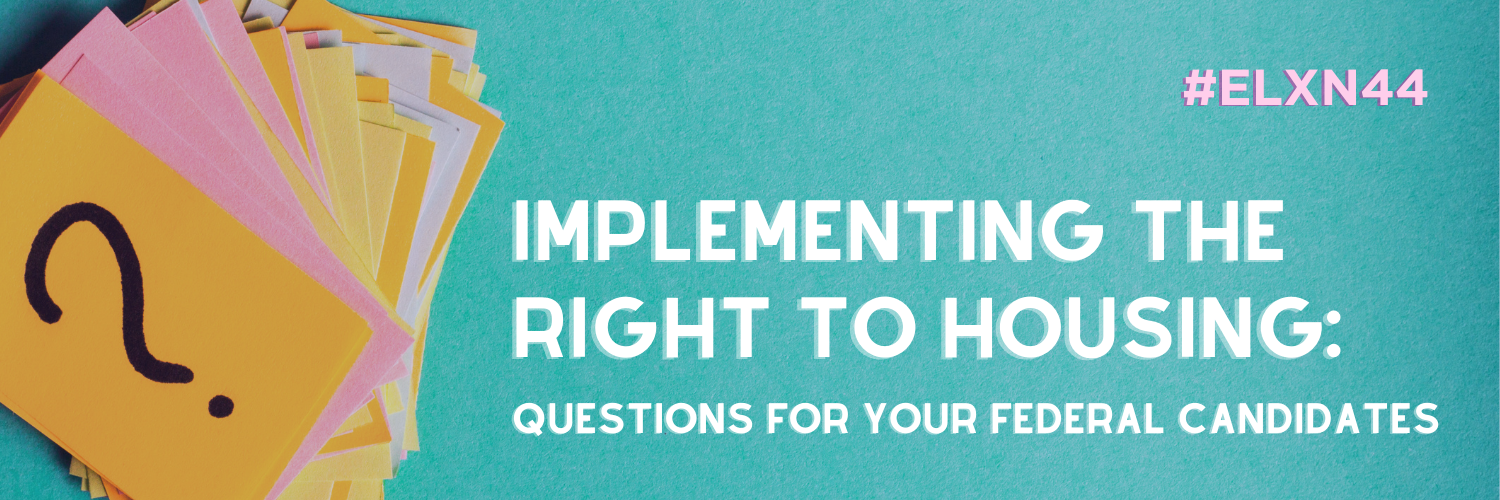
With the federal election around the corner (on September 20th, 2021) and housing emerging as a central election issue, we need to ensure that our federal candidates and leaders from every political party are committed to realizing the human right to housing.
We know that food, water, and shelter (i.e. housing) are the basic necessities of life. Yet adequate housing is becoming inaccessible to more and more people across Canada every day. Our federal government needs to take urgent and substantive action to address this growing housing crisis facing rights claimants in every corner of the country. This is not just a housing crisis—it’s a human rights crisis.
Here are some key questions to ask your local candidates and party leaders:
- If elected, when will your government appoint a Federal Housing Advocate to promote and ensure compliance with the government’s legislated commitment to the progressive realization of the right to housing?
The Federal Housing Advocate is a key pillar of the 2019 National Housing Strategy Act. They need to be immediately appointed and well-resourced, so that they can begin investigating and addressing systemic housing issues across the country. This will in turn drive forward the “progressive realization of the right to housing,” which requires that Canada continuously take steps towards fully realizing the human right to housing over time.Among the systemic issues that the Federal Housing Advocate can begin investigating and addressing are: inadequate Northern, rural, and remote housing; lack of accessible housing for persons with disabilities; financialization and rising rents; evictions and renovictions; housing disparities based on race, gender, income, age, ability/disability, citizenship status, sexual orientation, or other markers of difference; homelessness and inadequate housing among Indigenous peoples and communities; inadequate federal supports for low-income individuals and families (i.e. people in core housing need); lack of taxation on large corporate landlords/Real Estate Investment Trusts (REITs); and more.
- Will your party commit to fully implementing the human right to housing, as recognized in the National Housing Strategy Act (NHSA) and international law?
The right to housing is not an abstract concept or up to interpretation of our political leaders; it is a well-defined human right that has been recognized by the United Nations and committed to by Canada for decades. Our federal government must demonstrate political will with respect to implementing this internationally recognized right to housing. It must apply international standards and guidelines—which treat housing as a human right rather than a commodity—to all federal housing and housing-adjacent policies and programs going forward, including the entirety of the National Housing Strategy (NHS). This will require more participatory processes to involve rights claimants (i.e. people facing housing need) in decision-making, policy-making, and program development.A rights-based approach to housing also requires monitoring and accountability mechanisms to ensure that everyone in Canada has equitable access to adequate housing. While the NHSA already mandates three important accountability mechanisms—the Federal Housing Advocate, the National Housing Council, and the Review Panels which will hold hearings on systemic issues—there must be mechanisms in place to ensure that Canada’s Minister of Families, Children and Social Development meaningfully implements their recommendations.
The federal government must also collect disaggregated data on the impact and outcomes of NHS housing programs, particularly on marginalized groups (i.e. Indigenous, Black, racialized, disabled, 2SLGBTQQIA, and low-income persons ad well as women, immigrants, refugees, youth, older adults, etc.), in order to ensure that these programs are actually reaching people facing housing need in a non-discriminatory fashion. Researchers have found that, in their current form, many of the federally-funded programs under the NHS do not actually produce affordable housing for people in greatest need of housing.
- Will your government implement a Residential Tenant Support Benefit to address the arrears and evictions crisis facing tenants who lost income during the pandemic?
Thousands of tenants across the country lost income during the pandemic, accumulated arrears, and now face eviction into homelessness. These looming evictions are an unacceptable violation of the right to housing, and disproportionately harm already-marginalized tenants. Advocates from across the country have proposed a low-cost, federally-funded Residential Tenant Support Benefit (RTSB) which would bring tenants’ rent-to-income ratio back to pre-pandemic levels and ensure that everyone stays housed during the pandemic and beyond.
Wondering how to engage with you federal candidates? You can voice your questions and concerns in various ways including:
- When your candidates (or someone from their team) calls or visits you;
- At virtual town halls, debates, and all-candidates meetings;
- On social media;
- On radio phone-in shows;
- By visiting a candidate’s campaign office; or,
- By sending a letter to party leaders and local candidates!
To start the conversation, you can introduce yourself briefly, and explain why implementing the right to housing is important to you, your family, and/or your community. This can involve stating your concerns (e.g., lack of affordable housing, rapidly rising housing costs, Real Estate Investment Trusts [REITs] driving up rental prices, evictions, renovictions, speculative housing prices, financialization, housing treated as a commodity instead of a human right, etc.). Then you should ask your question(s).
Remember to be respectful, but make sure that they answer your questions. Write your questions down in case you need to leave them with a candidate for follow-up. You should also record their answers so that can hold your future representative to account!
Send a letter via the Vote Housing campaign
You can also send a letter to your local candidates and federal party leaders using Vote Housing’s simple form. This will let them know that you want to see solutions to housing and homelessness—like Vote Housing’s 6-point election platform—on the campaign trail:

